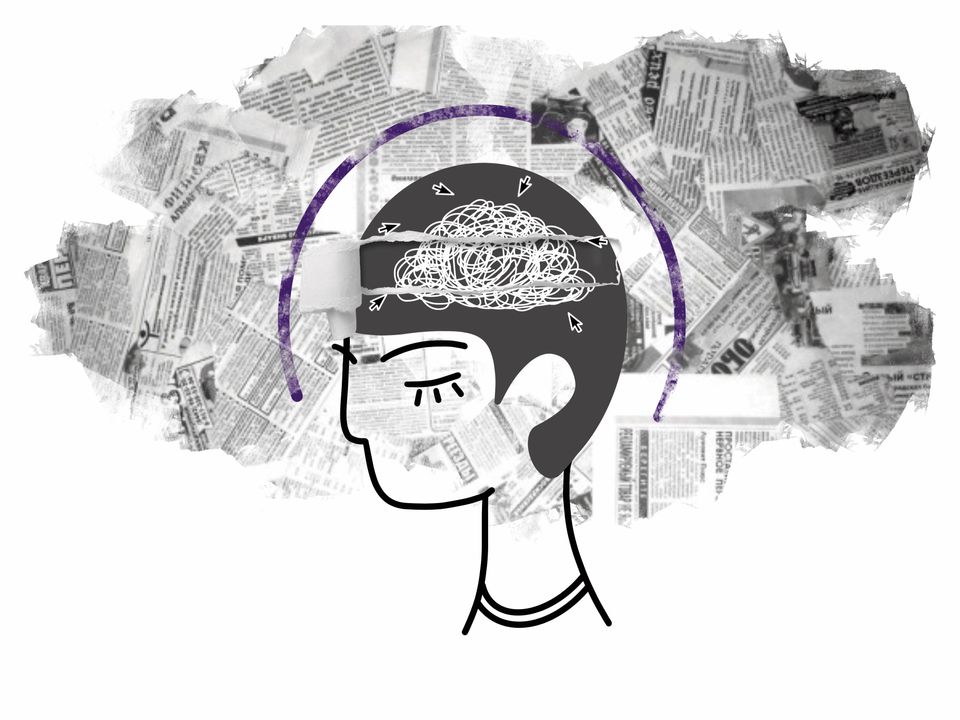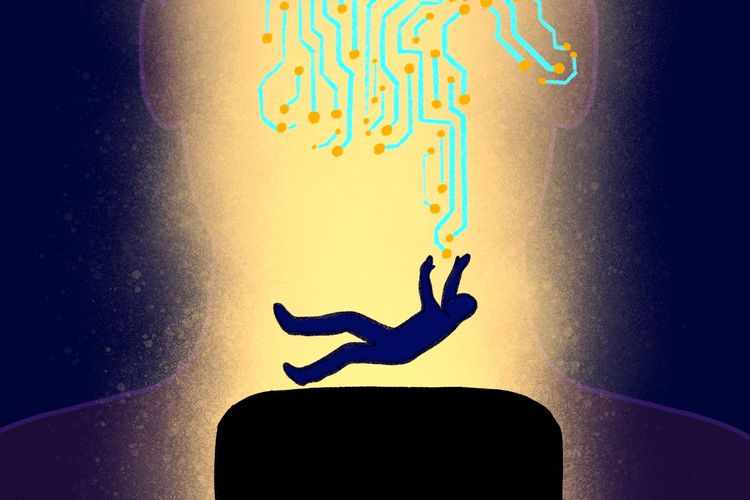Towards Technopoly: The Broken Defences

Art: Jessica Keiko Mitsumasu ©
Previously in the series: The Improbable World
Introduction: Reading Postman in 20xx
Summary: Chapter 5
In this chapter, Postman traces the decline, fall, and subsequent rise of forms of information control. He describes the necessity of social and moral organizing principles to a well-functioning society, and he details the counterproductive replacements offered by vaunted techno-priests of Technopoly.
In short, Postman is making an argument for the value of what we have lost, however imperfect the former things were. He is also highlighting the insufficiency of the techniques designed and offered to replace what those same techniques have destroyed. As much as Technopoly is a system of techniques, “it is also a state of mind,” and we would do well to reflect on its assumptions.
Technopoly’s Ideal Habitat
Neil Postman was not a prophet in the religious sense, but his prescience of the conditions of our very-online lifestyle can’t be ignored. Postman argues in this chapter that the flood of information generated by electronic media — to say nothing of mobile devices and social media — has overwhelmed the institutions meant to manage our information environment. Ours is a society of growing distrust. We mistrust the government, the media, religious institutions, and even neighbours who vote differently, at alarming rates.
False or misleading information on the internet has become a rule, and can often out-perform more reliable sources. The solution, if you listen to the Big Tech CEOs, is the development of ever more impressive artificial intelligence systems to screen and filter online content. The solution is to develop new systems to manage the ungovernable systems. Teaching media literacy in schools is too slow and, of course, no one suggests that anyone limit their consumption of media. There is no looking away in a 24/7 media environment where producers and consumers are incentivized to maximize every spare moment, so we look to the techno-priests. But Postman warns against this. One definition of Technopoly is that it “is what happens when a culture, overcome by information generated by technology, tries to employ technology itself as a means of providing clear direction and humane purpose.”
Simplifications
The real world is complex, and managing it has always posed a great organizational and technical challenge to those who seek to exercise control. The complexity of reality is why we develop theories to help “in organizing, weighting, and excluding information.” Theories are not reality, however. Marxism quite obviously does not account for the whole of reality, as history was just the story of who happens to own the means of production. This too is a simplification. I’ve argued elsewhere that simplifications come with their own unique dangers, but since there is no all-governing Theory of Everything we need theories; people must see the world from somewhere.
The broken defences in the chapter’s title are the traditional institutions of information management. At the more quotidian level are the courts, schools, families, and political parties. Religion and the state operate at the myth-making level, providing stories that shape the horizons of possibility. Your family can tell you what it’ll take to guarantee tonight’s dessert but may struggle to articulate coherent answers to more fundamental questions.
Technopoly seeks to clear the field of what Postman calls competing “thought-worlds” in order to establish a monopoly in service to its own ends. Technopoly might claim to contribute to the effective management of a funeral home, but has nothing to say about mourning.
Technical Means & Human Ends
Without a transcendent narrative offering answers to the why’s of human existence, and without coherent moral underpinnings, Technopoly governs our society with all the shortcomings of ideological theories and none of the benefits. Postman has an idea about where this leaves us:
“Because that flood [of information] has laid waste the theories on which schools, families, political parties, religion, nationhood itself are based, American Technopoly must rely, to an obsessive extent, on technical methods to control the flow of information.”
With no clear or coherent human purpose, Technopoly elevates bureaucrats, experts, and the technical machinery of quantification. All three are, in essence, technical means that simplify reality for the purposes of control but, in Postman’s estimation, do so with no meaningful human purpose.
Postman illustrates Technopoly’s reductive logic by quoting C.S. Lewis’s description of Hell as “something like the bureaucracy of a police state or the office of a thoroughly nasty business concern.” For Postman, bureaucracies believe in nothing; they have no political or moral code, only the unstated assumption that “efficiency is the principal aim of all social institutions and that other goals are essentially less worthy if not irrelevant.” It wasn’t always like this, of course. In a less complex world, it was possible for the technical machinery of bureaucracy to serve social institutions, but it soon burst its bounds. Postman cites rapid industrial growth, advances in transportation and communication, and the extension and centralization of government as factors in the growth of bureaucracy into “an autonomous meta-institution that largely serves itself.”
We see this in constant demands for increased efficiency, empty of concern for the people for which decisions are being made, which inevitably breeds more bureaucracy. The mediating effect of bureaucratic control also breeds a dangerous distance between technical means and human ends. It’s why Adolf Eichmann, a principal architect of the Holocaust, was able to say, in effect, what bureaucrats everywhere still say: “I have no responsibility for the human consequences of my decisions. I am only responsible for the efficiency of my part of the bureaucracy, which must be maintained at all costs.”
Postman goes on to detail the role of experts and standardization within Technopoly. His critique of expertise hinges on its outsize role under Technopoly, and not a wholesale rejection of expertise in the more contemporary vein of finding one’s truth no matter the context. Here he is worth quoting at length.
“The role of the expert is to concentrate on one field of knowledge, sift through all that is available, eliminate that which has no bearing on a problem, and use what is left to assist in solving a problem. This process works fairly well in situations where only a technical solution is required and there is no conflict with human purposes—for example, in space rocketry or the construction of a sewer system. It works less well in situations where technical requirements may conflict with human purposes, as in medicine or architecture. And it is disastrous when applied to situations that cannot be solved by technical means and where efficiency is usually irrelevant, such as in education, law, family life, and problems of personal maladjustment. I assume I do not need to convince the reader that there are no experts—there can be no experts—in child-rearing and lovemaking and friend-making. All of this is a figment of the Technopolist’s imagination, made plausible by the use of technical machinery, without which the expert would be totally disarmed and exposed as an intruder and an ignoramus.”
As for excessive quantification, Postman takes aim at standardized tests and opinion polls. Under Technopoly, “we come to believe that our [test] score is our intelligence, or our capacity for creativity or love or pain. We come to believe that the results of opinion polls are what people believe.” Postman argues that these are simply outputs from the technical machinery required by bureaucrats and experts to function. By transforming what is complex and irreducible into an exact and technical form, and convincing the public to accept them as the reality, the managers are able to effectively manage.
To what human purpose are we managed? Technopoly is decidedly silent on the question, affirming only that it be done efficiently. As traditional institutions wane, Technopoly turns to the machinery of bureaucracy, expertise, and technique as a source of order and purpose. Postman promises that the rest of his book “tells the story of why this cannot work, and of the pain and stupidity that are the consequences.”
Technopoly Today
Technology as the solution to the problems created by technology is usually couched in the language of progress. New technology will make up for the shortcomings of the old, but we forget (so easily and so quickly, it seems) that the problem being addressed is usually the novel solution to a still older problem. We can see this cycle at work in the quasi-worship of tech startups and their widely adopted ethos of disruption, exemplified in Facebook’s unofficial motto: “Move fast and break shit.” Silicon Valley asks, “did we create a problem?” and answers “well, we have an app for that.” The veneration of novelty and disruption pushed by the new technocratic elite is Technopoly’s ideal habitat.
Here, the logic of the machine reigns. Where stewardship directed by human purposes other than consumption might be summarized by “reduce, reuse, and recycle” (two out of three which we’ve mostly given up on), technopoly persists and thrives under the mantra of “build, break, repeat.” The roots of our hyper-consumerism are deep and too complex to uncover here, but the information environment Postman explores in Chapter 5 is a key mechanism for maintaining the status quo.
Postman points out that theories — and their simplifications — are necessary, if imperfect. But in the information chaos of Technopoly, their organizing power is vulnerable. If new information stresses old theories, as Postman asserts, then it stands to reason that the torrent of information kicked off by the social and mobile web has already cleared the levees. We are a culture largely unmoored. “When there is too much information to sustain any theory, information becomes essentially meaningless.”
This brings us to one of the great challenges of living in the digital era: incoherence. Our information environment resists the sense-making of theories and we see the fallout most clearly in the arenas of public life and politics. In his 2020 CBC Massey lectures, Ron Deibert points out one of the unique dangers of information overload is the opportunity for bad actors to attack already weakened institutions. Referring to Russia-backed disinformation campaigns, he quotes Peter Pomerantsev to describe the challenge of “censorship through noise.” Faced with an unmanageable information environment, people are given over to a cynical fatalism in which “nothing is true and everything is possible.”1
There is no easy solution to this predicament and a backward-looking nostalgia would only threaten to paralyze us in its own way. Although there can be no return there is the hope of recovery. And while several chapters of naming the problem are still ahead of us, Postman is not ultimately hopeless, and we shouldn’t be either.
Further Reading


1 Deibert, Ronald J. Reset: Reclaiming the Internet for Civil Society. House of Anansi Press, 2020. ↩︎







Member discussion